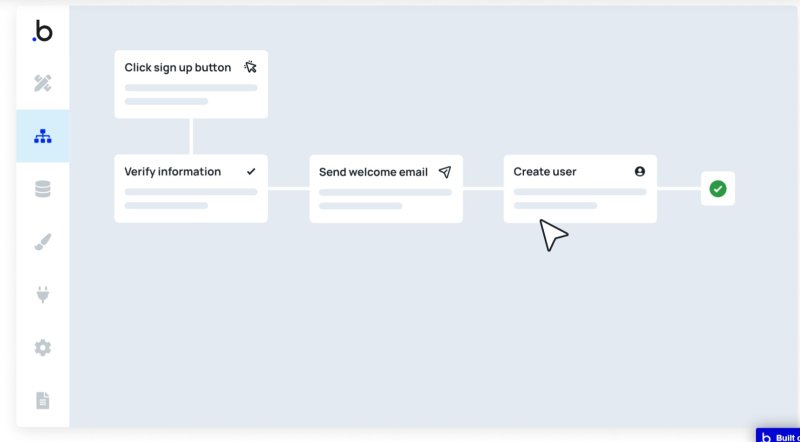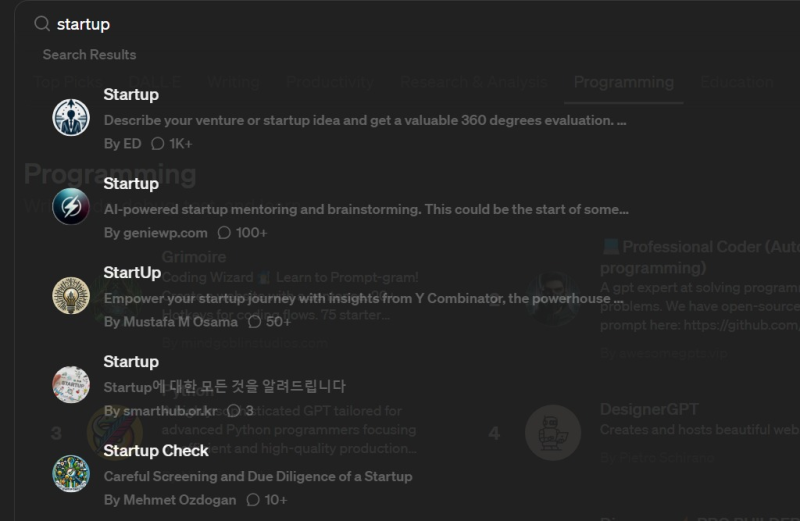When every day can bring a breakthrough, AI for startups becomes not so much an option as a necessity. Artificial intelligence enables young companies not only to manage resources more effectively and automate tasks but also opens the door to innovations that can define the future of the industry. In this article, we will take a closer look at AI tools that will help startups streamline business operations, planning, strategy, marketing, and prototyping, offering inspiring examples of applications. Read on to find out more.
AI for startups – table of contents
In what areas can AI for startups will help?
The development of technology AI for startups opens up a wide range of possibilities for them. From automating internal processes, through personalizing services, to advanced data analysis – AI becomes an integral element of the strategies of companies aiming to lead the market. For example, a startup operating in the e-commerce industry can use AI to personalize product recommendations for its customers, increasing sales effectiveness and building customer loyalty. In finance, AI can predict market trends.
In healthcare, it can support diagnosis. Startups operating in each of these sectors benefit from AI not only in terms of efficiency but also in the quality of services offered. However, let’s take a look at AI tools for startups that can be useful regardless of specialization.
Creating a website – Bubble.io
Bubble.io (https://bubble.io/) is a tool that is changing the approach to creating websites and applications, especially for startups. It simplifies the creation of feature-rich web and mobile applications on a visual programming platform, eliminating the need for coding. Unlike traditional website development with separate front-end, back-end, and database components, Bubble applications are built natively using an integrated cloud platform that encompasses the full range of technologies.
By integrating with AI tools such as ChatGPT, DALL-E 3, and Whisper, Bubble.io allows users to create advanced applications without extensive programming knowledge. And process automation allows you to trigger actions such as notifications or external API calls based on configured events. Access control, role-based permissions, and version history provide advanced management options for applications created in Bubble.
Startups can quickly prototype and launch innovative solutions, such as SaaS applications or social networks, which is critical in a rapidly changing business environment.

Source: Bubble.io
Programming – Github Copilot
Github Copilot (https://github.com/features/copilot) is a tool that is changing the face of programming by providing support based on large language models. For startups where resources are limited and the need to innovate quickly is high, Copilot can be invaluable.
For example, a startup working on new software could use Copilot to generate and review code, as well as create tests, speeding up project development and allowing focus on the creative aspects of work rather than routine coding.
Preparing an offer – GrammarlyGO
Grammarly (https://www.grammarly.com/ai) is a tool that improves the quality of business communication, which is critical for startups. With advanced text analysis and plagiarism detection, startups can create unique and professional proposals, quotes, or reports. For example, a startup offering IT services can use Grammarly to improve its business proposals, increasing the chances of success in negotiations with potential clients.
With the new GrammarlyGO feature powered by artificial intelligence, this AI tool for startups gains additional capabilities, such as:
- generating content ideas,
- creating drafts,
- Modifying existing content using prompts or suggestions.
The best features of GrammarlyGO, however, are the ability to set a unique brand voice by specifying the level of professionalism or official tone, as well as regionalization of the English language (American, Canadian, British, Australian, Indian). Unfortunately, the tool is currently only available to users of this language.
Creating marketing content – ChatGPT + DALL·E 3
The most versatile AI tool for startups is the synergy of ChatGPT and DALL-E 3 (https://chat.openai.com/). This indispensable duo opens up new possibilities for startups to create marketing content as well as brainstorm in all areas of the company.
ChatGPT can generate engaging and personalized texts, while Dalle-3 creates matching graphics for them. A startup operating in the tourism industry, for example, can use these tools to create unique destination descriptions along with unique illustrations, setting them apart from the competition.
A startup can reach an even higher level of innovation – expanding its capabilities and automating repetitive tasks – thanks to the full range of GPTs, which are specialized chatbots for specific tasks available to Chat GPT Plus users. By creating private GPTs independently, it is relatively easy to build a set of invaluable AI assistants.

Source: ChatGPT (https://chat.openai.com/)
Where to look for specialized AI for startups tools?
But what if the presented set of AI tools for startups is not enough? It’s worth turning to There’s An AI For That (https://theresanaiforthat.com/) – a platform that now hosts over 12,000 AI tools, offering startups access to a wide spectrum of solutions. By selecting tools best suited to their needs, startups can significantly accelerate the development of their business. For example, a company specializing in data analysis can find tools on ThereIsAnAIForThat for automating data collection and processing, allowing it to generate insights and recommendations for clients more quickly.
Smart use of AI tools boosts innovation and guides startup growth effectively. With platforms like Bubble.io, Github Copilot, GrammarlyGO, ChatGPT with Dalle-3, and ThereIsAnAIForThat, startups can compete better while delivering valuable services and products. Success lies in choosing tools that fit their specific needs and goals.

If you like our content, join our busy bees community on Facebook, Twitter, LinkedIn, Instagram, YouTube, Pinterest, TikTok.
Author: Robert Whitney
JavaScript expert and instructor who coaches IT departments. His main goal is to up-level team productivity by teaching others how to effectively cooperate while coding.
AI in business:
- Threats and opportunities of AI in business (part 1)
- Threats and opportunities of AI in business (part 2)
- AI applications in business - overview
- AI-assisted text chatbots
- Business NLP today and tomorrow
- The role of AI in business decision-making
- Scheduling social media posts. How can AI help?
- Automated social media posts
- New services and products operating with AI
- What are the weaknesses of my business idea? A brainstorming session with ChatGPT
- Using ChatGPT in business
- Synthetic actors. Top 3 AI video generators
- 3 useful AI graphic design tools. Generative AI in business
- 3 awesome AI writers you must try out today
- Exploring the power of AI in music creation
- Navigating new business opportunities with ChatGPT-4
- AI tools for the manager
- 6 awesome ChatGTP plugins that will make your life easier
- 3 grafików AI. Generatywna sztuczna inteligencja dla biznesu
- What is the future of AI according to McKinsey Global Institute?
- Artificial intelligence in business - Introduction
- What is NLP, or natural language processing in business
- Automatic document processing
- Google Translate vs DeepL. 5 applications of machine translation for business
- The operation and business applications of voicebots
- Virtual assistant technology, or how to talk to AI?
- What is Business Intelligence?
- Will artificial intelligence replace business analysts?
- How can artificial intelligence help with BPM?
- AI and social media – what do they say about us?
- Artificial intelligence in content management
- Creative AI of today and tomorrow
- Multimodal AI and its applications in business
- New interactions. How is AI changing the way we operate devices?
- RPA and APIs in a digital company
- The future job market and upcoming professions
- AI in EdTech. 3 examples of companies that used the potential of artificial intelligence
- Artificial intelligence and the environment. 3 AI solutions to help you build a sustainable business
- AI content detectors. Are they worth it?
- ChatGPT vs Bard vs Bing. Which AI chatbot is leading the race?
- Is chatbot AI a competitor to Google search?
- Effective ChatGPT Prompts for HR and Recruitment
- Prompt engineering. What does a prompt engineer do?
- AI Mockup generator. Top 4 tools
- AI and what else? Top technology trends for business in 2024
- AI and business ethics. Why you should invest in ethical solutions
- Meta AI. What should you know about Facebook and Instagram's AI-supported features?
- AI regulation. What do you need to know as an entrepreneur?
- 5 new uses of AI in business
- AI products and projects - how are they different from others?
- AI-assisted process automation. Where to start?
- How do you match an AI solution to a business problem?
- AI as an expert on your team
- AI team vs. division of roles
- How to choose a career field in AI?
- Is it always worth it to add artificial intelligence to the product development process?
- AI in HR: How recruitment automation affects HR and team development
- 6 most interesting AI tools in 2023
- 6 biggest business mishaps caused by AI
- What is the company's AI maturity analysis?
- AI for B2B personalization
- ChatGPT use cases. 18 examples of how to improve your business with ChatGPT in 2024
- Microlearning. A quick way to get new skills
- The most interesting AI implementations in companies in 2024
- What do artificial intelligence specialists do?
- What challenges does the AI project bring?
- Top 8 AI tools for business in 2024
- AI in CRM. What does AI change in CRM tools?
- The UE AI Act. How does Europe regulate the use of artificial intelligence
- Sora. How will realistic videos from OpenAI change business?
- Top 7 AI website builders
- No-code tools and AI innovations
- How much does using AI increase the productivity of your team?
- How to use ChatGTP for market research?
- How to broaden the reach of your AI marketing campaign?
- "We are all developers". How can citizen developers help your company?
- AI in transportation and logistics
- What business pain points can AI fix?
- Artificial intelligence in the media
- AI in banking and finance. Stripe, Monzo, and Grab
- AI in the travel industry
- How AI is fostering the birth of new technologies
- The revolution of AI in social media
- AI in e-commerce. Overview of global leaders
- Top 4 AI image creation tools
- Top 5 AI tools for data analysis
- AI strategy in your company - how to build it?
- Best AI courses – 6 awesome recommendations
- Optimizing social media listening with AI tools
- IoT + AI, or how to reduce energy costs in a company
- AI in logistics. 5 best tools
- GPT Store – an overview of the most interesting GPTs for business
- LLM, GPT, RAG... What do AI acronyms mean?
- AI robots – the future or present of business?
- What is the cost of implementing AI in a company?
- How can AI help in a freelancer’s career?
- Automating work and increasing productivity. A guide to AI for freelancers
- AI for startups – best tools
- Building a website with AI
- OpenAI, Midjourney, Anthropic, Hugging Face. Who is who in the world of AI?
- Eleven Labs and what else? The most promising AI startups
- Synthetic data and its importance for the development of your business
- Top AI search engines. Where to look for AI tools?
- Video AI. The latest AI video generators
- AI for managers. How AI can make your job easier
- What’s new in Google Gemini? Everything you need to know
- AI in Poland. Companies, meetings, and conferences
- AI calendar. How to optimize your time in a company?
- AI and the future of work. How to prepare your business for change?
- AI voice cloning for business. How to create personalized voice messages with AI?
- Fact-checking and AI hallucinations
- AI in recruitment – developing recruitment materials step-by-step
- Midjourney v6. Innovations in AI image generation
- AI in SMEs. How can SMEs compete with giants using AI?
- How is AI changing influencer marketing?
- Is AI really a threat to developers? Devin and Microsoft AutoDev
- AI chatbots for e-commerce. Case studies
- Best AI chatbots for ecommerce. Platforms
- How to stay on top of what's going on in the AI world?
- Taming AI. How to take the first steps to apply AI in your business?
- Perplexity, Bing Copilot, or You.com? Comparing AI search engines
- ReALM. A groundbreaking language model from Apple?
- AI experts in Poland
- Google Genie — a generative AI model that creates fully interactive worlds from images
- Automation or augmentation? Two approaches to AI in a company
- LLMOps, or how to effectively manage language models in an organization
- AI video generation. New horizons in video content production for businesses
- Best AI transcription tools. How to transform long recordings into concise summaries?
- Sentiment analysis with AI. How does it help drive change in business?
- The role of AI in content moderation


















